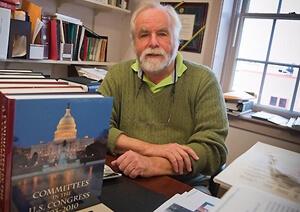Staffers in the Congressional Research Office were skeptical, to put it mildly, when University of Vermont political science professor Garrison Nelson approached them in 1975 about producing the first comprehensive history of legislative committees in the U.S. Senate and House of Representatives. Such a volume would be impossible to produce, they said, with information buried in obscure resolutions deep in the archives.
Thirty-five years, tens of thousands of hours, and millions of scanned pages later, Nelson has proved the experts wrong with the publication last month, by Congressional Quarterly Press, of the seventh and (perhaps) final volume of a work -- Committees of the U.S. Congress -- that tracks every single member's committee comings-and-goings from 1789 to 2010, and provides a wealth of additional committee information to boot. Nelson's co-author on the project is Charles Stewart of MIT.
While such a work might seem arcane at best to average citizens, it is of great use to insiders -- earlier volumes are ragged and dog-eared, according to the Senate's chief historian, Richard A. Baker.
It should also be a trove for future historians; committee assignments breed friendships, Nelson says (think Obama/Biden, who served together on the Senate Foreign Relations Committee), and are a key to understanding the interpersonal networks that shape history.
To say that Nelson is a font of information on House and Senate history seriously understates the photographic grasp he has of even the most trivial details.
With apologies to Harpers, what follows are a series of Congressional factlets culled one recent afternoon -- on the eve of what could be an historic Congressional election -- from the brain of Professor Nelson, assisted by his monumental reference work.
2: Number of Congressmen who failed to vote on the Mutual Security Act of 1952, of 77 members who spoke to the bill on the House floor. One of the non-voters was John F. Kennedy, who had a reputation for laziness early in his Congressional career. In retaliation for his laissez-faire ways, Speaker John McCormack kept Kennedy off the powerful Rules Committee, his top choice, instead banishing him to the low prestige District of Columbia Committee.
21: Number of Speakers of the House who served on the Ways & Means Committee, once viewed by members as a path to the Speakership. No speaker since John McCormack has served on the committee.
4: Number of African-American Senators since Reconstruction ended in 1877: Ed Brooke of Massachusetts, 1965-79; Carole Moseley Braun, 1993-99; Barack Obama, 2005-2008, and Roland Burris, 2009-2010, all of Illinois.
6: Number of committee chairs in the 20th century who went on to become Speaker of the House, of a total of 19. Until the Gingrich revolution of 1994, which dramatically weakened the committee system in the House, committee chairs and the party leadership battled for control of the chamber, and chairs were frequently on the outs with the floor leaders.
1: Number of House Speakers who were victims of a stabbing. Frederick Muhlenberg, the first Speaker of the House, was non-fatally stabbed by his brother-in-law in 1795 for casting the tie-breaking vote ratifying the Jay Treaty, which sought to improve post-war American-British relations.
7: Number of times post-1900 Speakers of the House remained in the House after their party lost control. If current Speaker Nancy Pelosi loses her majority, she can choose between two precedents: five times the dethroned Speaker became Minority Leader. Twice ex-Speakers left the leadership and returned to their committees, including the most recently deposed Speaker, Dennis Hastert.
11: Number of Senate Foreign Relations Committee members who were nominated for President or Vice President, of a total of 23 senators in all, since Congress was reorganized in 1946. Both President Obama and Vice President Biden served on the committee, viewed as a stepping stone to the Presidency, as did John Kennedy.
0: Number of House Democrats on the Select Bipartisan Committee to Investigate the Preparation for and Response to Hurricane Katrina, the only one of 1700-plus committees with "bipartisan" in its title and the least bipartisan committee in the history of Congress. Democrats viewed the committee as an attempt to fix blame for the disaster on local officials' lack of preparation, rather than on the Bush administration's response, and refused to participate.
54: Number of consecutive years, 1937-1991, when at least one Democratic House party leader came from Massachusetts or Texas. Members of the "Austin-Boston" connection included Sam Rayburn, John McCormack, Tip O'Neill, and Jim Wright, who served as either Speaker or majority or minority leader during the period.
52: Number of years served by Robert C. Byrd of West Virginia on the Senate Appropriations Committee, 1959-2010.
3: Number of Kennedy brothers who served on Senate Labor and Public Welfare Committee -- John, Ted, and Robert.
8: Number of former members of Congress in the Obama Administration: ex-Senators President Barack Obama, Vice President Joe Biden, Secretary of State Hillary Clinton, and Secretary of the Interior Ken Salazar; as well as former House members Secretary of Labor Hilda Solis, Secretary of Transportation Ray LaHood, White House Chief of Staff Rahm Emanuel, and CIA Chief Leon Panetta.
